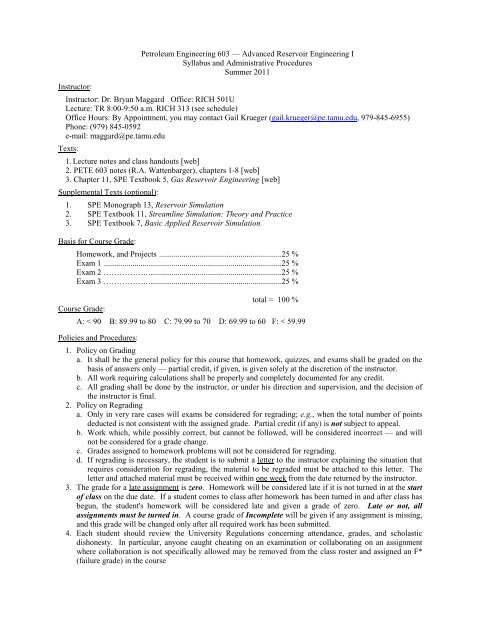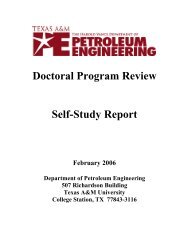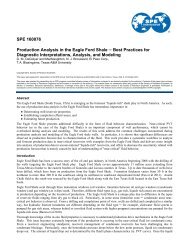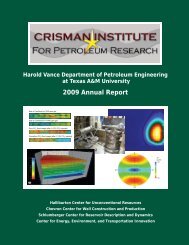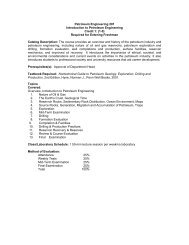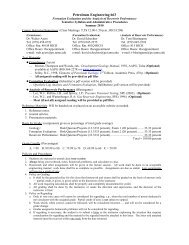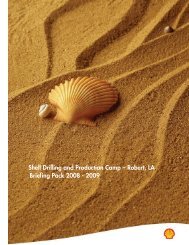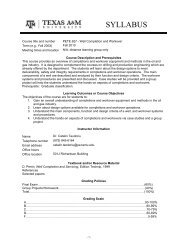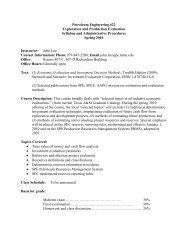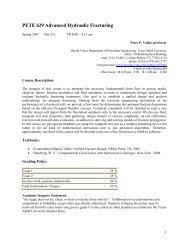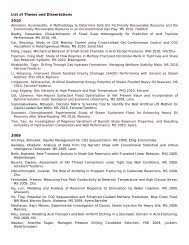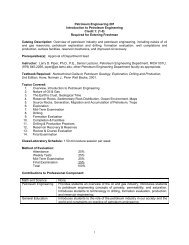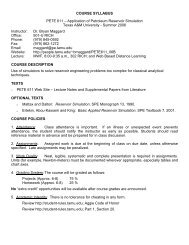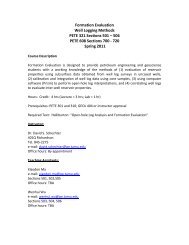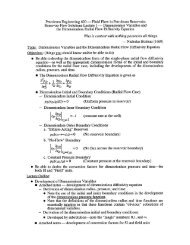PETE 603 Advanced Reservoir Engineering
PETE 603 Advanced Reservoir Engineering
PETE 603 Advanced Reservoir Engineering
Create successful ePaper yourself
Turn your PDF publications into a flip-book with our unique Google optimized e-Paper software.
Instructor:<br />
Petroleum <strong>Engineering</strong> <strong>603</strong> — <strong>Advanced</strong> <strong>Reservoir</strong> <strong>Engineering</strong> I<br />
Syllabus and Administrative Procedures<br />
Summer 2011<br />
Instructor: Dr. Bryan Maggard Office: RICH 501U<br />
Lecture: TR 8:00-9:50 a.m. RICH 313 (see schedule)<br />
Office Hours: By Appointment, you may contact Gail Krueger (gail.krueger@pe.tamu.edu, 979-845-6955)<br />
Phone: (979) 845-0592<br />
e-mail: maggard@pe.tamu.edu<br />
Texts:<br />
1. Lecture notes and class handouts [web]<br />
2. <strong>PETE</strong> <strong>603</strong> notes (R.A. Wattenbarger), chapters 1-8 [web]<br />
3. Chapter 11, SPE Textbook 5, Gas <strong>Reservoir</strong> <strong>Engineering</strong> [web]<br />
Supplemental Texts (optional):<br />
1. SPE Monograph 13, <strong>Reservoir</strong> Simulation<br />
2. SPE Textbook 11, Streamline Simulation: Theory and Practice<br />
3. SPE Textbook 7, Basic Applied <strong>Reservoir</strong> Simulation<br />
Basis for Course Grade:<br />
Homework, and Projects ............................................................ 25 %<br />
Exam 1 ....................................................................................... 25 %<br />
Exam 2 …………….. ................................................................. 25 %<br />
Exam 3 …………….. ................................................................. 25 %<br />
Course Grade:<br />
total = 100 %<br />
A: < 90 B: 89.99 to 80 C: 79.99 to 70 D: 69.99 to 60 F: < 59.99<br />
Policies and Procedures:<br />
1. Policy on Grading<br />
a. It shall be the general policy for this course that homework, quizzes, and exams shall be graded on the<br />
basis of answers only — partial credit, if given, is given solely at the discretion of the instructor.<br />
b. All work requiring calculations shall be properly and completely documented for any credit.<br />
c. All grading shall be done by the instructor, or under his direction and supervision, and the decision of<br />
the instructor is final.<br />
2. Policy on Regrading<br />
a. Only in very rare cases will exams be considered for regrading; e.g., when the total number of points<br />
deducted is not consistent with the assigned grade. Partial credit (if any) is not subject to appeal.<br />
b. Work which, while possibly correct, but cannot be followed, will be considered incorrect — and will<br />
not be considered for a grade change.<br />
c. Grades assigned to homework problems will not be considered for regrading.<br />
d. If regrading is necessary, the student is to submit a letter to the instructor explaining the situation that<br />
requires consideration for regrading, the material to be regraded must be attached to this letter. The<br />
letter and attached material must be received within one week from the date returned by the instructor.<br />
3. The grade for a late assignment is zero. Homework will be considered late if it is not turned in at the start<br />
of class on the due date. If a student comes to class after homework has been turned in and after class has<br />
begun, the student's homework will be considered late and given a grade of zero. Late or not, all<br />
assignments must be turned in. A course grade of Incomplete will be given if any assignment is missing,<br />
and this grade will be changed only after all required work has been submitted.<br />
4. Each student should review the University Regulations concerning attendance, grades, and scholastic<br />
dishonesty. In particular, anyone caught cheating on an examination or collaborating on an assignment<br />
where collaboration is not specifically allowed may be removed from the class roster and assigned an F*<br />
(failure grade) in the course
2<br />
Course Description<br />
This course includes basic equations, derivations and underlying principles used in reservoir modeling.<br />
Prerequisites by Topic<br />
• Differential and integral calculus.<br />
• Ordinary and partial differential equations.<br />
• Fluid dynamics and heat transfer.<br />
• <strong>Reservoir</strong> fluid properties.<br />
• <strong>Reservoir</strong> petrophysics.


